Featured Articles
ATLAS, POVETKIN IN UPHILL FIGHT FOR HEAVYWEIGHT TITLE

 photo Jens Meyer, AP
photo Jens Meyer, AP
Sometimes folks grow so used to seeing people do the wrong thing that when someone does the right thing they think it’s wrong. Teddy Atlas is the latest to be victimized by what we’ll call the “Right Way Is Wrong’’ syndrome.
Saturday night Atlas will lead heavyweight contender Alexander Povetkin into a ring in Erfurt, Germany to face former champion Ruslan Chagaev for the somewhat vacant WBA title. It’s not really vacant since Wladimir Klitschko owns it but the alphabet organizations have a way of always making room for an extra sanction fee one way or another and so they have in this case.
Klitschko is now a unified “super’’ champion and so the title is ‘’vacant’’ even while he still wears it. If you are confused, welcome to boxing.
Confusion reigns in this sport, which is why so few sports fans care about it anymore. In boxing up is down, right is wrong and making the wise decision is a vice not a virtue.
A year or so ago Atlas rejected a shot at Klitschko for young Povetkin because, of all reasons, with only 19 professional fights he wasn’t going to sacrifice his future for a payday. That cost Atlas about $200,000 and, frankly, Povetkin about the same because of the way his contract would be stepped on by promoters, managers and their various agents and minions.
There is a risk-reward ratio in boxing that must always be measured. The usual way they do it in boxing is you make the fighter take the risk and you keep most of the rewards. Atlas sees it differently, which is why he rejected the fight and was highly criticized by the No Nothing Party for it.
His job, as he sees it, is to not only train young Povetkin but also to put him in fights that make sense. There might be a time it made sense to risk him against the bigger, harder punching and vastly more experienced Klitschko but that was not the time. That will remain true regardless of what happens Saturday night in Erfret, even though some will argue otherwise.
If Povetkin loses, Atlas’ critics will say he got him beat for short money. They will say he could have made vastly more against Klitschko, which is true if you only look at the gross and forget about the net. In boxing, as with the IRS, the net is all the matters and what Povetkin was going to net against Klitschko was very likely a career-altering beating for very short money.
Saturday night the money is no better but his chance to win is. At least it would have been had Povetkin’s management team allowed (or forced if necessary) him to come to America as was his contractual obligation and train for eight weeks with Atlas.
Atlas’ deal with Povetkin has always been that he would travel to Russia to train him when his work at ESPN allowed. But during the ESPN2 fight season, which ends with the beginning of college football and begins in January, the fighter was supposed to train in the U.S.
This time he did not, for reasons really only known to Povetkin and his manager, and Atlas refused to put his full-time job at risk simply to please them. Ultimately he decided he would not train Povetkin at all for the biggest fight of his life, a decision they refused to accept. Atlas remained firm until his phone rang about a month ago and it was the 31-year-old Povetkin, who speaks little English, calling just to say hello.
Not long after that, at a press conference in Germany to hype the fight, writers noticed Atlas was missing and asked Povetkin who his trainer was. He said “Teddy Atlas.’’
At that point, for the second time in his two-year stint with the former Olympic gold medalist, Atlas did what others would not. He put himself at risk.
Just as he stood up to German promoter Wilfried Sauerland, refusing to send Povetkin like a lamb to the slaughter against a far more experienced and well prepared Klitschko, he stood up against his own instincts and got on a plane to Russia knowing it was far too late for the kind of full training camp one needs for a fight of this magnitude.
In both cases, Atlas did what far too few do in boxing. He did the right thing and yet if Povetkin’s hand isn’t raised Saturday night he’s going to catch hell. That’s what happens in boxing. You try to do the right thing and you catch hell. You roll over and conduct business as usual and everybody thinks you’re smart, a realist or both.
My colleague Eric Raskin postulated several days ago that if Povetkin loses, Atlas’ career as a top-flight trainer is over because he will be perceived as someone who blocked his fighter from an opportunity and then got him beaten for a lesser opportunity.
Someone who sees what happened in these two cases that way should not be licensed to box because their vision is impaired. Protecting your fighter from a match he isn’t ready for is not something to be vilified for. It’s good business.
Sticking by him even when the people around him – either through ignorance, arrogance or worse, corruption – break their contractual obligations to his trainer and create a problem-filled work environment in the months before the biggest fight of his life should not be something other fighters fear. It should be something they seek.
“What happened was it got to be about three weeks before the fight and the fighter himself and the people asked me to come over and I found out that they had made no other arrangements and the fighter was waiting for me and I had a decision to make, more from a personal standpoint, I guess a moral standpoint where – do I stay away from it?’’ Atlas said this week.
“Because we didn’t have the situation that was agreed to, my brain told me that a little bit, but my heart told me, do I want to be thinking about the fighter being left alone? And I didn’t want to be thinking about that.
“So I got on a plane. I went to (Chekhov, Russia) about three weeks and two days before the fight and as I said, we had a very condensed training camp, not the amount of sparring that we would normally want to have, especially southpaw sparring because we are fighting a southpaw.
“I organized things the best I could from a mental standpoint, trying to get his mind right in the time that was allowed and trying to get the – obviously the game plan, the strategy in place. I think we’ve done a good job getting the strategy in place. We understand what will work against Chagaev and what to be concerned about with Chagaev. My biggest concern was having not the full amount of time for physical training, that’s my biggest concern that we didn’t have that and the full amount of time in sparring.
“Look, either I’m going to keep my damn mouth shut and say nothing, which I probably should do sometimes, or I’m going to tell the truth. I’d feel more comfortable if I had more time. Do I feel we’ve done the best we could do in these conditions, in these circumstances? Yes, I do.’’
Atlas is a realist. He sees the world not as he’d like it to be but as it is. He knows an ambush disguised as an opportunity is a trap, as the Klitschko fight was. He knows Povetkin was contractually bound to be in New Jersey two months ago and was prevented or allowed not to do it at his peril.
Atlas was not willing, nor should he have been, to put his primary job at risk with ESPN for people who were not willing to honor their word, a contract or what was best for their fighter. Yet, in the end, he swallowed both his pride and his good sense and went to Russia three weeks and two days before Saturday night’s fight to do what he could for a young man who still believes, “Teddy Atlas is my trainer.’’
If those things make him unemployable as a trainer it says more about boxing’s ills than it does about Atlas.
On Saturday night Atlas will have run out of time but he’ll be where he felt he needed to be. He’ll be in Alexander Povetkin’s corner. If a few other people claiming to be actually had been the fighter would have been at his optimum for the toughest fight of his career.
Come what may, Alexander Povetkin’s real problem won’t be the man in front of him or the man in his corner. His problems will be sitting in expensive seats they got for free wearing expensive suits guys like Povetkin paid for. They won’t be in his corner when the fight starts. Then again, they never really were any way.
Featured Articles
Mekhrubon Sanginov, whose Heroism Nearly Proved Fatal, Returns on Saturday
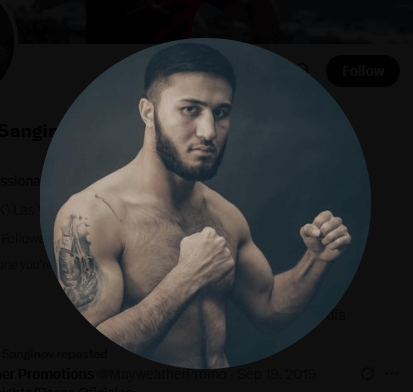
To say that Mekhrubon Sanginov is excited to resume his boxing career would be a great understatement. Sanginov, ranked #9 by the WBA at 154 pounds before his hiatus, last fought on July 8, 2022.
He was in great form before his extended leave, having scored four straight fast knockouts, advancing his record to 13-0-1. Had he remained in Las Vegas, where he had settled after his fifth pro fight, his career may have continued on an upward trajectory, but a trip to his hometown of Dushanbe, Tajikistan, turned everything haywire. A run-in with a knife-wielding bully nearly cost him his life, stalling his career for nearly three full years.
Sanginov was exiting a restaurant in Dushanbe when he saw a man, plainly intoxicated, harassing another man, an innocent bystander. Mekhrubon intervened and was stabbed several times with a long knife. One of the puncture wounds came perilously close to puncturing his heart.
“After he stabbed me, I ran after him and hit him and caught him to hold for the police,” recollects Sanginov. “There was a lot of confusion when the police arrived. At first, the police were not certain what had happened.
“By the time I got to the hospital, I had lost two liters of blood, or so I was told. After I was patched up, one of the surgeons said to me, ‘Give thanks to God because he gave you a second life.’ It is like I was born a second time.”

“I was in the wrong place at the wrong time. It could have happened in any city,” he adds. (A story about the incident on another boxing site elicited this comment from a reader: “Good man right there. World would be a better place if more folk were willing to step up when it counts.”)
Sanginov first laced on a pair of gloves at age 10 and was purportedly 105-14 as an amateur. Growing up, the boxer he most admired was Roberto Duran. “Muhammad Ali will always be the greatest and [Marvin] Hagler was great too, but Duran was always my favorite,” he says.
During his absence from the ring, Sanginov married a girl from Tajikistan and became a father. His son Makhmud was born in Las Vegas and has dual citizenship. “Ideally,” he says, “I would like to have three more children. Two more boys and the last one a daughter.”
He also put on a great deal of weight. When he returned to the gym, his trainer Bones Adams was looking at a cruiserweight. But gradually the weight came off – “I had to give up one of my hobbies; I love to eat,” he says – and he will be resuming his career at 154. “Although I am the same weight as before, I feel stronger now. Before I was more of a boy, now I am a full-grown man,” says Sanginov who turned 29 in February.
He has a lot of rust to shed. Because of all those early knockouts, he has answered the bell for only eight rounds in the last four years. Concordantly, his comeback fight on Saturday could be described as a soft re-awakening. Sanginov’s opponent Mahonri Montes, an 18-year pro from Mexico, has a decent record (36-10-2, 25 KOs) but has been relatively inactive and is only 1-3-1 in his last five. Their match at Thunder Studios in Long Beach, California, is slated for eight rounds.
On May 10, Ardreal Holmes (17-0) faces Erickson Lubin (26-2) on a ProBox card in Kissimmee, Florida. It’s an IBF super welterweight title eliminator, meaning that the winner (in theory) will proceed directly to a world title fight.
Sanginov will be watching closely. He and Holmes were scheduled to meet in March of 2022 in the main event of a ShoBox card on Showtime. That match fell out when Sanginov suffered an ankle injury in sparring.
If not for a twist of fate, that may have been Mekhrubon Sanginov in that IBF eliminator, rather than Ardreal Holmes. We will never know, but one thing we do know is that Mekhrubon’s world title aspirations were too strong to be ruined by a knife-wielding bully.
To comment on this story in the Fight Forum CLICK HERE
Featured Articles
Jaron ‘Boots’ Ennis Wins Welterweight Showdown in Atlantic City
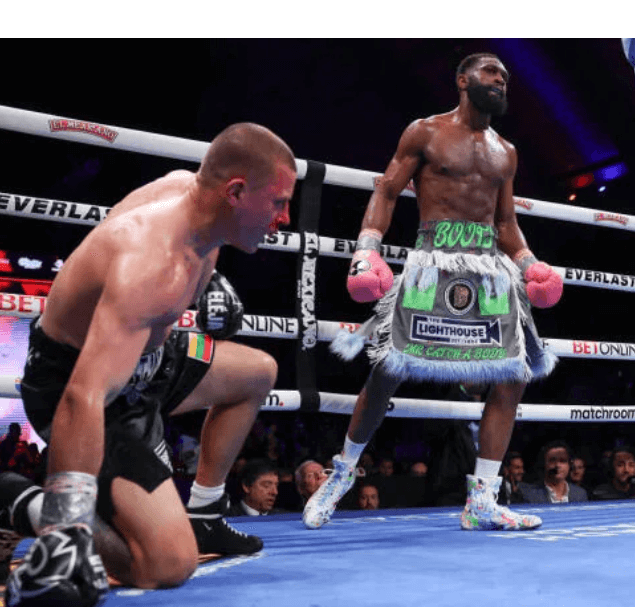
In the showdown between undefeated welterweight champions Jaron “Boots Ennis walked away with the victory by technical knockout over Eamantis Stanionis and the WBA and IBF titles on Saturday.
No doubt. Ennis was the superior fighter.
“He’s a great fighter. He’s a good guy,” said Ennis.
Philadelphia’s Ennis (34-0, 30 KOs) faced Lithuania’s Stanionis (15-1, 10 KOs) at demonstrated an overpowering southpaw and orthodox attack in front of a sold-out crowd at Boardwalk Hall in Atlantic City, New Jersey.
It might have been confusing but whether he was in a southpaw stance or not Ennis busted the body with power shots and jabbed away in a withering pace in the first two rounds.
Stanionis looked surprised when his counter shots seemed impotent.
In the third round the Lithuanian fighter who trains at the Wild Card Gym in Hollywood, began using a rocket jab to gain some semblance of control. Then he launched lead rights to the jaw of Ennis. Though Stanionis connected solidly, the Philly fighter was still standing and seemingly unfazed by the blows.
That was a bad sign for Stanionis.
Ennis returned to his lightning jabs and blows to the body and Stanionis continued his marauding style like a Sherman Tank looking to eventually run over his foe. He just couldn’t muster enough firepower.
In the fifth round Stanionis opened up with a powerful body attack and seemed to have Ennis in retreat. But the Philadelphia fighter opened up with a speedy combination that ended with blood dripping from the nose of Stanionis.
It was not looking optimistic for the Lithuanian fighter who had never lost.
Stanionis opened up the sixth round with a three-punch combination and Ennis met him with a combination of his own. Stanionis was suddenly in retreat and Ennis chased him like a leopard pouncing on prey. A lightning five-punch combination that included four consecutive uppercuts delivered Stanionis to the floor for the count. He got up and survived the rest of the round.
After returning shakily to his corner, the trainer whispered to him and then told the referee that they had surrendered.
Ennis jumped in happiness and now holds the WBA and IBF welterweight titles.
“I felt like I was getting in my groove. I had a dream I got a stoppage just like this,” said Ennis.
Stanionis looked like he could continue, but perhaps it was a wise move by his trainer. The Lithuanian fighter’s wife is expecting their first child at any moment.
Meanwhile, Ennis finally proved the expectations of greatness by experts. It was a thorough display of superiority over a very good champion.
“The biggest part was being myself and having a live body in front of me,” said Ennis. “I’m just getting started.”
Matchroom Boxing promoter Eddie Hearn was jubilant over the performance of the Philadelphia fighter.
“What a wonderful humble man. This is one of the finest fighters today. By far the best fighter in the division,” said Hearn. “You are witnessing true greatness.”
Other Bouts
Former featherweight world champion Raymond Ford (17-1-1, 8 KOs) showed that moving up in weight would not be a problem even against the rugged and taller Thomas Mattice (22-5-1, 17 KOs) in winning by a convincing unanimous decision.
The quicksilver southpaw Ford ravaged Mattice in the first round then basically cruised the remaining nine rounds like a jackhammer set on automatic. Four-punch combinations pummeled Mattice but never put him down.
“He was a smart veteran. He could take a hit,” said Ford.
Still, there was no doubt on who won the super featherweight contest. After 10 rounds all three judges gave Ford every round and scored it 100-90 for the New Jersey fighter who formerly held the WBA featherweight title which was wrested from him by Nick Ball.
Shakhram Giyasov (17-0, 10 KOs) made good on a promise to his departed daughter by knocking out Argentina’s Franco Ocampo (17-3, 8 KOs) in their welterweight battle.
Giyasov floored Ocampo in the first round with an overhand right but the Argentine fighter was able to recover and fight on for several more rounds.
In the fourth frame, Giyasov launched a lead right to the liver and collapsed Ocampo with the body shot for the count of 10 at 1:57 of the fourth round.
“I had a very hard camp because I lost my daughter,” Giyasov explained. “I promised I would be world champion.”
In his second pro fight Omari Jones (2-0) needed only seconds to disable William Jackson (13-6-2) with a counter right to the body for a knockout win. The former Olympic medalist was looking for rounds but reacted to his opponent’s actions.
“He was a veteran he came out strong,” said Jones who won a bronze medal in the 2024 Paris Olympics. “But I just stayed tight and I looked for the shot and I landed it.”
After a feint, Jackson attacked and was countered by a right to the rib cage and down he went for the count at 1:40 of the first round in the welterweight contest.
Photo credit: Matchroom
To comment on this story in the Fight Forum CLICK HERE
Featured Articles
Boxing Notes and Nuggets from Thomas Hauser
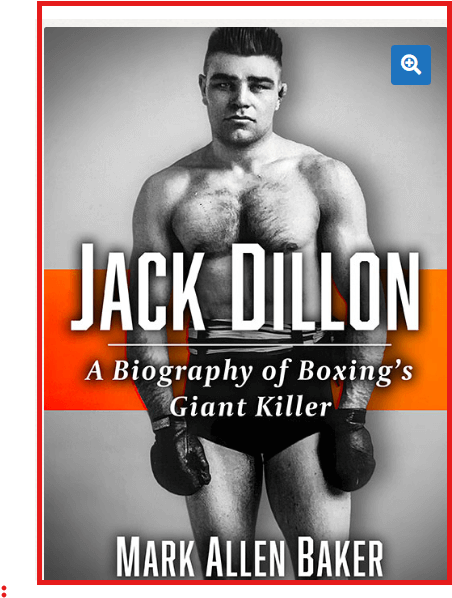
Jack Dillon’s name doesn’t resonate with boxing fans today. But he was important in his time.
Ernest Coulter Price was born in 1891 and turned pro at age seventeen. According to legend, when asked his name by the referee before his first fight, he answered “Sidney Dillon” (the name of a racehorse in a stable where he’d worked). The referee misunderstood him, announced him as “Jack Dillon,” and Jack Dillon was his fighting name from then on.
Dillon stood a shade over 5 feet 7 inches tall. He earned renown as a small light-heavyweight, was known as “Jack the Giant Killer,” and compiled a 94-9-16 (65 KOs, 2 KOs by) ring record not counting an estimated 125 “newspaper decisions.” He defeated Battling Levinsky in 1914 to claim the world 175-pound championship and lost the title to Levinsky two years later. He fought Levinsky ten times, winning six with two losses and two draws.
Dillon was always willing to go in tough. But he fought too long, got hit too often, and drank too much. He died at age 51 in a state psychiatric hospital in Florida.
Jack Dillon by Mark Allen Baker (McFarland & Company) tracks Dillon’s life and ring career from beginning to end. To his credit, Baker has done an enormous amount of research. But his writing style is heavy. He falls short of recreating a long-ago era when boxing captivated America. The character portraits are one-dimensional. And the book reads as though, after studying hundreds if not thousands of newspaper clippings, Baker decided to insert every bit of information he found. There are descriptions of fight after fight after fight after fight after fight after fight. After a while, most of the fights no longer seem to matter.
And when Baker tries to liven things up, he lapses into hyperbole (e.g. writing of Dillon, “From the opening gong, it was clear to every opponent, regardless of size or skill, that they were destined for destruction . . . When he looked up [toward the heavyweight division], there wasn’t a heavyweight alive who didn’t fear for his life.”)
I also had the feeling that, to prove the case for Dillon’s greatness, Baker massages the facts a bit. For example, lobbying for the idea that Dillon was deserving of a shot at heavyweight champion Jess Willard, Baker argues that several fighters had beaten much larger men to claim the heavyweight crown. He then cites James Corbett’s victory over John L. Sullivan (a supposed 35-pound weight differential), Bob Fitzsimmons’s triumph over Corbett (26 pounds), and Tommy Burns over Marvin Hart (45 pounds).
The problem is, those numbers are suspect. Adam Pollack (a leading authority on boxing’s early gloved champions) says that there were no official weigh-ins for heavyweight fights way back when. Weights were sometimes announced by a fighter’s camp in the lead-in to a fight or otherwise shared with the public. But the numbers were often inaccurate.
Both The Ring Record Book and Pollack’s research point to far smaller weight differentials than the numbers put forth by Baker. That’s important because it goes to the issue of scholarship. And yes; when Jack Dempsey brutalized Jess Willard, he was outweighed by at least fifty pounds. But Jack Dillon was no Jack Dempsey.
Still, even with its flaws, Jack Dillon performs a service in that it brings attention to a forgotten fighter and puts a great deal of information at the fingertips of readers who want to know more about “Jack the Giant Killer.”
* **
Jody Heaps spent three decades as a senior creative director and executive producer for boxing-related projects at Showtime. In recent years, he has redirected his attention to projects of his own. His two most recent efforts are worthy of mention.
One Night in the Many Deaths of Sonny Liston is a 40-minute play that imagines the last night of Liston’s life in December 1970 and his death at the hands of a “statuesque, provocatively-dressed, Las Vegas showgirl in her late-twenties” who visits his home unannounced with a “gift” from Sonny’s mob associates – a small packet of adulterated heroin that by design will kill him.
The writing flows exceptionally well. The play humanizes Liston in a credible way. And the tension builds nicely. But the narrative strains credibility with the plot twist that Liston accepts his death as inevitable and shoots up knowing that the heroin will kill him.
More recently, Heaps has written, directed, and co-produced a ten-minute play titled A Mop of Angels that can be seen in its entirety on YouTube at https://www.youtube.com/watch?v=hImmcG2pivM
Rich O’Brien is wonderful in the role of Spencer Olrich (an aging actor who has been replaced as the star of a successful action-movie franchise) and is now reading a play for minimal pay in a ninety-nine-seat black box theater in the middle of nowhere.
Or is that really who Olrich is?
Two themes – aging and the magic of theatre – are intertwined throughout the narrative. Olrich’s thoughts include:
* “Old age is the most surprising event in a man’s life. And the cruelest. I thought that getting old would take a whole lot longer than it did. And the worst part, you never see it coming until it’s too late.”
* “Nobody knows what happens after we exit this mortal coil. And nobody’s in any hurry to find out. But that fear of the unknown; that’s not the scariest part. You know what is? Being forgotten. You may die when your heart stops beating. But you cease to exist when nobody remembers your name.”
* “This school board contends that theater is a luxury. And you’re right. Theater doesn’t stop wars or end famines or cure deadly diseases. Yet a life without theater would be no life at all. For theater is where we celebrate the joy of our humanity and mourn the pain of our existence; where we pretend to be others only to discover ourselves. To you school board members in your suits and your ties, theater may be a luxury. But for those of us who dream, theater is no more of a luxury than wings are to an angel.”
Theatrical writing is an often-thankless endeavor. But Heaps loves doing it and says, “I’ve gotten better as I keep plugging away at it. At least, I hope I have.”
Does Jody miss boxing?
“Not at all,” he answers. “I always had mixed feelings about boxing. I still enjoy conversations about it from time to time. But do I follow it? No.”
* **
If you’ve been to one final pre-fight press conference, you’ve been to all of them. That’s a slight exaggeration. But the comments do tend to be predictable. Herewith, an example of what you’ll hear from the promoter and main event fighters.
The promoter will speak longer than all of the fighters on the card combined. His opening remarks will be along the lines of:
“I’d like to thank [name of site] for hosting this great event. There’s a saying in boxing that you haven’t fought until you’ve fought at [repeat name of site]. I’d also like to give a shout out to [names of sponsors]. And most importantly, thank you to [insert name of entity or individual funding the fight card]. We have a massive stacked event on tap. This might be the best fight card in the history of [repeat name of site]. [Name of main event A-side fighter] is the fastest-rising star in boxing today. But he’ll be facing a huge challenge when he looks across the ring on [insert date] and sees [name of B-side opponent] standing across from him.”
Toward the end of the proceedings after almost everyone in attendance has lost interest, the B-side fighter in the main event will speak:
“What’s up, everybody. I’d like to thank [name of promoter], [name of network],[my whole team], and God. I had a great training camp. Fighting [name of opponent] at [name of site] is an opportunity I’ve been waiting for my whole life. I’ve been through some things that wasn’t all my fault. But this is a dream come true. It means everything to me. From the time I was a little boy, I dreamed of seeing my face on posters. Not in the post office like my uncle was, but for a fight like this. I’m in the best career of my shape. Or whatever. You know what I mean. I’m looking forward to putting on a show and winning this fight for my fans. [Name of opponent] is a good fighter. I take my hat off to him. But I’m going to shock the world on Saturday night.”
And last, a word from the main event A-side fighter:
“I got nothing to say today. I’m tired of being disrespected by [names of offending entities]. I don’t listen to what people say about me. But what they say about me really pisses me off. You can all suck my [body part of choice].”
Thomas Hauser’s email address is thomashauserwriter@gmail.com. His most recent book – MY MOTHER and me – is a personal memoir available at Amazon.com. https://www.amazon.com/My-Mother-Me-Thomas-Hauser/dp/1955836191/ref=sr_1_1?crid=5C0TEN4M9ZAH&keywords=thomas+hauser&qid=1707662513&sprefix=thomas+hauser%2Caps%2C80&sr=8-1
In 2004, the Boxing Writers Association of America honored Hauser with the Nat Fleischer Award for career excellence in boxing journalism. In 2019, Hauser was selected for boxing’s highest honor – induction into the International Boxing Hall of Fame.
To comment on this story in the Fight Forum CLICK HERE
-
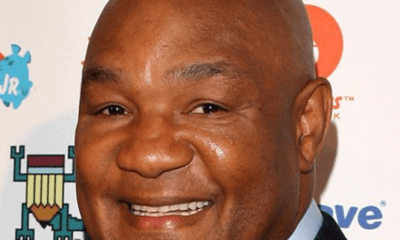
 Featured Articles4 weeks ago
Featured Articles4 weeks agoBernard Fernandez Reflects on His Special Bond with George Foreman
-
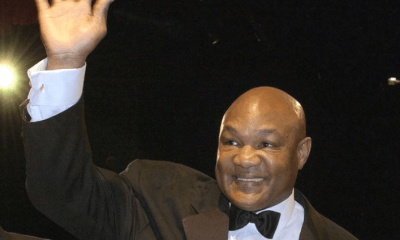
 Featured Articles3 weeks ago
Featured Articles3 weeks agoA Paean to George Foreman (1949-2025), Architect of an Amazing Second Act
-

 Featured Articles4 weeks ago
Featured Articles4 weeks agoNotes and Nuggets from Thomas Hauser: Callum Walsh Returns to Madison Square Garden
-
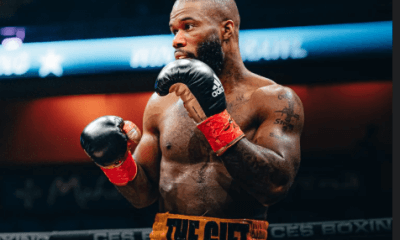
 Featured Articles4 weeks ago
Featured Articles4 weeks agoSpared Prison by a Lenient Judge, Chordale Booker Pursues a World Boxing Title
-
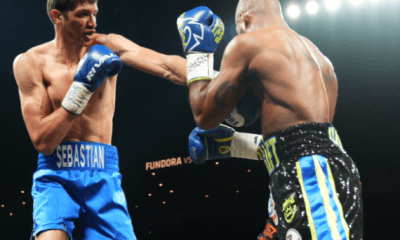
 Featured Articles3 weeks ago
Featured Articles3 weeks agoSebastian Fundora TKOs Chordale Booker in Las Vegas
-
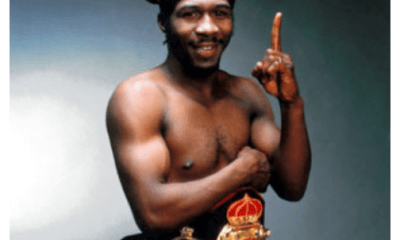
 Featured Articles3 weeks ago
Featured Articles3 weeks agoBoxing Odds and Ends: The Wacky and Sad World of Livingstone Bramble and More
-
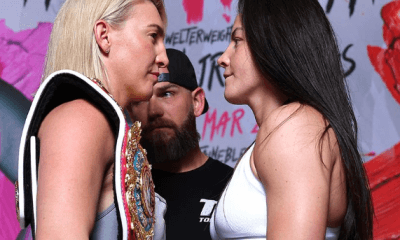
 Featured Articles3 weeks ago
Featured Articles3 weeks agoAvila Perspective, Chap. 319: Rematches in Las Vegas, Cancun and More
-
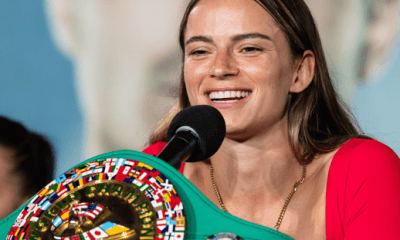
 Featured Articles4 weeks ago
Featured Articles4 weeks agoAvila Perspective, Chap. 318: Aussie Action, Vegas and More















